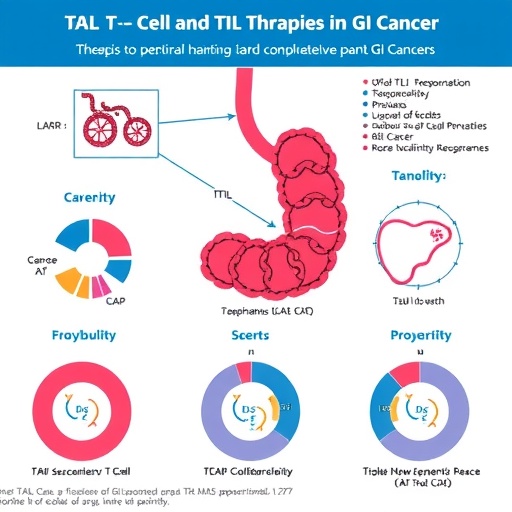In the relentless battle against gastrointestinal malignancies, immunotherapy has emerged as a beacon of hope, transforming once grim prognoses into stories of resilience and recovery. Among the most promising advances are the therapies involving chimeric antigen receptor T-cells (CAR T-cells) and tumor-infiltrating lymphocytes (TILs). A newly published comprehensive review by Sayed et al. in Medical Oncology illuminates the cutting-edge clinical applications of these immunotherapeutic strategies, painting an encouraging future for patients facing these aggressive cancers.
Gastrointestinal cancers, encompassing malignancies of the esophagus, stomach, pancreas, liver, and intestines, remain among the leading causes of cancer-related mortality worldwide. Traditional treatments—including surgery, chemotherapy, and radiation—often fall short due to late diagnosis and intrinsic resistance mechanisms. Immunotherapy’s promise lies in its ability to harness the body’s own immune system, specifically T-cells, to detect and annihilate cancer cells with unprecedented precision.
CAR T-cell therapy represents a revolutionary approach that genetically engineers a patient’s T-cells to express chimeric antigen receptors, enabling these immune cells to recognize tumor-associated antigens directly. This artificial receptor design bypasses conventional antigen-presenting requirements, empowering T-cells to target cancer cells vigorously. Originally celebrated for hematological malignancies, CAR T-cells have now made significant inroads into solid tumors, including the notoriously challenging gastrointestinal malignancies.
The review meticulously details the evolution of CAR T-cell constructs tailored to gastrointestinal tumors, emphasizing the refinement of antigen targets to enhance specificity and reduce off-target effects. Shared antigens such as CEA (carcinoembryonic antigen) and mesothelin have been focal points due to their prevalent expression on gastrointestinal tumor cells. However, hurdles remain, particularly tumor heterogeneity and the immunosuppressive tumor microenvironment that impairs T-cell infiltration and function.
Complementing CAR T-cell therapy is the strategy of tumor-infiltrating lymphocytes (TILs) therapy. Unlike CAR T-cells, TILs are a heterogeneous population of naturally occurring T-cells extracted from tumor tissues. These lymphocytes have demonstrated intrinsic tumor-reactivity, and their ex vivo expansion followed by reinfusion offers a personalized immunotherapeutic approach. Although TIL therapy has been predominantly investigated in melanoma, early-phase trials are unveiling meaningful antitumor activity in gastrointestinal malignancies.
Sayed and colleagues underscore the critical role of the tumor microenvironment in modulating response to TIL therapy. Factors such as immunosuppressive cytokines, regulatory T-cells, and metabolic constraints dampen the effectiveness of TILs in situ. Therefore, combinatorial approaches integrating checkpoint inhibitors, cytokine administration, or metabolic modulators are being explored to amplify TIL persistence and cytotoxic function post-adoptive transfer.
An exciting frontier discussed in the review involves the synergistic pairing of CAR T-cells and TIL therapies with other modalities. For instance, preconditioning chemotherapy or radiation can transiently deplete host lymphocytes, optimizing the engraftment of infused T-cells and breaking immunologic tolerance. Moreover, the integration of immune checkpoint blockade can unleash exhausted T-cells within the tumor niche, augmenting therapeutic efficacy.
The authors also highlight the importance of advancing manufacturing techniques to address logistical challenges inherent in personalized T-cell therapies. Innovations in cell culture systems, gene editing technologies, and real-time monitoring of T-cell phenotype and function are indispensable for delivering safe, scalable, and cost-effective treatments to patients.
Crucially, the review sifts through emerging clinical data from ongoing trials. Early indications reveal that while safety profiles remain manageable, durable responses in gastrointestinal cancers demand further optimization of antigen targeting, T-cell persistence, and overcoming immune escape. Nonetheless, the promising results herald a paradigm shift wherein immunotherapy could transition from salvage interventions to frontline treatment options.
Safety concerns, notably cytokine release syndrome (CRS) and neurotoxicity associated with CAR T-cell therapies, receive detailed attention. The authors advocate for the development of controllable CAR designs—such as inducible or suicide switch-equipped constructs—to mitigate adverse effects without compromising antitumor potency. Parallel efforts are underway to better understand TIL-related toxicities and to establish standardized management protocols.
An insightful aspect of the review touches upon biomarker discovery to predict responders and non-responders. Molecular profiling of tumors to identify antigen expression patterns, immune infiltration scores, and genomic signatures holds the key to personalized patient stratification. This precision medicine approach aims to maximize benefit while sparing patients from unnecessary toxicity.
Looking forward, the authors emphasize the necessity for multidisciplinary collaboration encompassing oncologists, immunologists, bioengineers, and computational biologists. Such integrated efforts are critical to unravel the complex interplay between cancer cells and the immune system, facilitating the design of next-generation cellular therapies with enhanced specificity, persistence, and adaptability.
Fundamentally, the review by Sayed et al. is a testament to the transformative potential of harnessing T-cell immunity against gastrointestinal malignancies. By dissecting current challenges and highlighting innovative solutions, the article serves as a vital roadmap guiding researchers and clinicians toward improving patient outcomes through the finesse of engineered and naturally occurring lymphocyte therapies.
In summary, this landmark synthesis of existing literature brings a renewed sense of optimism to a domain once marred by therapeutic stagnation. CAR T-cell and TIL therapies, armed with cutting-edge molecular engineering and a deeper understanding of tumor immunobiology, are poised to rewrite the narrative of gastrointestinal cancer treatment in the near future. As ongoing trials mature and technological refinements take hold, these immunotherapies may well emerge as pillars of cancer care, offering hope where few options remain.
Subject of Research:
Immunotherapeutic interventions involving CAR T-cell and tumor-infiltrating lymphocyte (TIL) therapies for the treatment of gastrointestinal malignancies.
Article Title:
Chimeric antigen receptor T-cell (CAR T-cell) and tumor-infiltrating lymphocytes (TILs) therapies in gastrointestinal malignancies: review of literature for clinical applications.
Article References:
Sayed, M.S., Gadelmawla, A.F., Abouelenin, O. et al. Chimeric antigen receptor T-cell (CAR T-cell) and tumor-infiltrating lymphocytes (TILs) therapies in gastrointestinal malignancies: review of literature for clinical applications. Med Oncol 42, 481 (2025). https://doi.org/10.1007/s12032-025-03040-5
Image Credits: AI Generated




